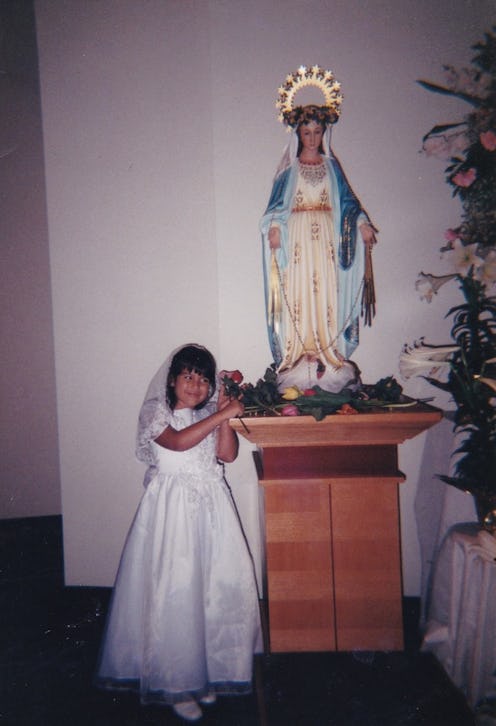Life
I Left Catholicism But Ash Wednesday Matters To Me

I was born on a Tuesday and went to my first church service that Sunday. From the time I was born until the time I was 15, I could literally count the Sundays when I had missed church on one hand. So six years ago, when I was 14 and came home from my Catholic school on Ash Wednesday conspicuously missing my ashes, my parents noticed right away.
I sat them down in our living room and essentially “came out of the closet” about my beliefs. From the time I was eight years old, I knew I did not experience religion and spirituality the same way they did. For my mother and father, the Catholic Church is truly a guiding light and a saving grace — it helped both of them through tough childhoods, gave them a solid foundation upon which to build a family, and provided a moral compass to lead them through life.
But for me, religion was a painfully exclusive club that I just never quite got the invitation to join. My prayer was perfunctory, the only part of mass I enjoyed was the breakfast cooked afterwards by the Knights of Columbus in the parish hall, and I had a Nietzsche-like skepticism of the Catholic conception of God since I could talk. During the year prior to my tell-all confession, I was becoming increasingly angry, bitter and resentful toward the Church and my parents, because it seemed like everyone was in the club except me.
I felt a ticking clock, too. I was approaching confirmation age, and the thought of further initiating myself into the religious community from which I felt so separated felt impossible. Continuing my lie and disingenuously completing one of the Catholic Church’s most sacred traditions just to avoid my parents’ displeasure seemed wrong. I didn’t believe in a higher power, but I realized I needed to ere on the side of caution, just in case.
So I spilled my guts. If you didn’t grow up in a deeply religious family, the full measure of my anxiety, terror, and nausea might be lost on you. I seriously hadn’t ruled out the possibility that I would get kicked out of my house. But this confession was no longer optional to me; it was absolutely necessary to my mental health and spiritual well-being.
There was a lot of crying, head-shaking, and disbelief. Predictably, my parents didn’t trust my judgement. “It’s a phase, everyone has doubts, let’s bring you to talk to our priest,” they said emphatically, certain that I was just going through a tough time. And although I was frustrated that they didn’t understand right away, I loved them even more for their support. They couldn’t, or wouldn’t, accept my confession then, but to them, the Catholic Church is the greatest purpose in life. They still wanted that for me, and that was even more meaningful than a blank, disappointed acceptance.
Ironically, Ash Wednesday now has spiritual significance for me that it never really held before. It’s my celebration of honesty and self-awareness — the anniversary of the first time I really stood up for myself and decided a direction for my life. My relationship with religion and spirituality is still extremely complicated, because even if you’re secure in your faith, what 20-year-old isn’t still trying to figure herself out? That day didn’t magically resolve my confusion or doubts, but it marked the beginning of a more authentic journey of confronting my spiritual self.
Ash Wednesday is also the anniversary of my commitment to a more open and honest relationship with my parents. Even if it causes tension and conflict between us, I owe it to my family to be myself. Being different from your family is challenging, frustrating, and sometimes agonizing, but ignoring your differences doesn’t make them go away. My definitions of happiness might differ, but ultimately, my parents really just want me to be happy and they will accept that happiness when they see it.
Ash Wednesday is the start of the struggle through the Lenten season — for me, it still symbolizes my struggle to understand my spirituality. Six years after my confession, I’m still exploring my religious identity and still navigating my relationship with my parents. But I grew up in a drastically different culture than my parents, and structured religion doesn’t have to be the only conduit through which to explore that identity anymore.
We owe it to ourselves to define these holidays in our own ways. Religion is cultural as well as spiritual, and individualizing religious traditions makes them accessible to everyone. Although I don’t celebrate Ash Wednesday in the strictly Catholic context, it has a special, spiritual meaning to me that I believe any god would be proud of.